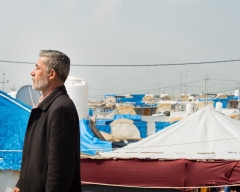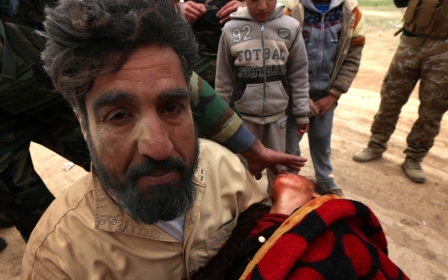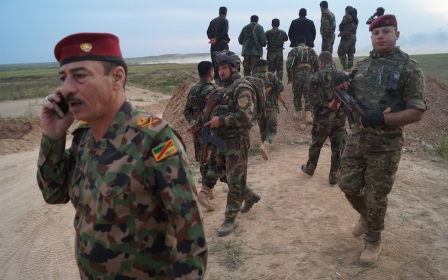Mosul family lives on hope alone in refugee camp

BARDARASH REFUGEE CAMP, Iraq - Back when they lived in Mosul, before the Islamic State group (IS) captured the city, the Zuhaers were a family who made a living running a general store. The father, Abdikarim, handled the business while his three sons studied in school.
Now, they reside in Bardarash Refugee Camp in the Kurdish region of northern Iraq, which is plagued by high unemployment.
“I teach at school for free, in hopes that someday the government will pay me and I can go back to school myself,” said Luaed, the eldest son.
According to the most recent camp profile, completed by the REACH Initiative last September, 42 percent of Bardarash Refugee Camp families reported no income in the month preceding the assessment.
“We have a hard life here. I know some families who don’t have 1,000 dinar (US 85 cents) in their tents,” said Abdul Hamid, a Bardarash camp resident also from Mosul.
Bardarash camp, in Duhok province, is home to 11,154 internally displaced persons (IDPs) who live in 2,830 tents. Camp management is closing the doors to any newcomers this month as it’s reaching capacity.
Hamid works with camp management to ascertain what families need in their tents. He speaks Kurdish, Arabic and a local dialect. Hamid boasts that he knows the location of every family’s tent, a skill relied on by management. Still, he has never been compensated for his services.
Life for refugees and IDPs in the Kurdistan Region of Iraq had a promising start, boosted by a strong economy and feelings of solidarity with those fleeing the IS. However, according to the World Bank, since 2014 economic growth in the KRI has contracted five percent and the poverty rate has more than doubled to 8.1 percent.
“No Arabs, no Yazidis, and no Christians live here. We just have one Christian family who converted to Islam,” said Bilal Habi, the assistant camp manager.
The family he is referring to is the Zuhaers. They share one small tent to sleep in and another for cooking. In the corner of the sleeping tent hang seven worn articles of clothing. The ragtag collection is all the clothes they fled Mosul with, and to this day it is all they have.
They converted to Islam in 2000. The father, Abdikarim, was the first to convert, and the rest of his family followed.
“Most of our neighbors were Muslim, but no one forced us. We felt it in our hearts. God was calling us,” said his wife, Laela.
While their tents are slightly removed from the main road through the camp, they are surrounded by neighbours on all sides.
“Even sleeping here is hard, because of the noise. We hear everything our neighbours do. We cannot sleep,” Laela said.
Seeking safety
The family fled to the safety of Bardarash 18 months ago. When IS took Mosul in June 2014, they walked for six hours to the safety of Bartella, an Assyrian town less than 20 kilometres from Mosul, where they were able to stay for three months.
But war was close behind them. As IS advanced, Bartella lost access to water and electricity. The Zuhaers stayed for two more days, until the peshmerga arrived.
“When the peshmerga came, they said everyone should leave.... by car, by foot, just go,” Luaed said.
On 7 August 2014, they left Bartella at 4am. “It took seven hours and at one point we were separated because my husband has trouble walking,” Laela said.
Abdikarim is 60 years old and cannot work because of a stroke he had two years ago. Laela gets emotional when she talks of her husband’s illness. She takes him to a doctor in Erbil, an hour’s drive away, for medication, but the family is having trouble paying for these visits as they work for no income.
“We don’t have any money. The doctor is so far away and his medications cost 120,000 dinar a month ($108),” she said, holding out a plastic bag filled with medicine.
Abdikarim is a thin man who doesn’t speak much. As his wife busies herself making tea and lamenting his health, he sits cross-legged and contemplative in their small tent.
Asked if paying jobs would encourage his family to put down roots in Bardarash, he said: “Even if they gave me a beautiful house, I wouldn’t stay here. Every day, I just keep thinking maybe tomorrow, maybe tomorrow we can go back.”
Luaed is more hopeful. “Maybe I will be first in line to get a job or get paid when they start paying people again,” he said.
The Kurdistan Regional Government’s Ministry of Planning reports a 28 percent increase in population amid an influx of 1.5 million refugees and a subsequent overall drop in wages as a result.
No money
IDPs and refugees are not the only ones suffering from lowered or nonexistent wages; all government employees have experienced either partial cuts or elimination of their salaries. The peshmerga, the KRG’s all-volunteer military force defending the borders against IS, haven’t received salaries in more than four months.
Still, there is hope, though it may seem distant at times. The International Organisation for Migration (IOM), an inter-governmental organisation, is a leader in community revitalisation and livelihood training programs. Their programme is targeting 15 governorates across Iraq, including Duhok province.
“IOM supported nearly 1,400 small business start-up beneficiaries through the provision of business development training and business-support packages. Moreover, IOM provided vocational training for 188 beneficiaries and 77 beneficiaries were provided with on-job training,” said Sandra Black, a spokeswoman for IOM’s Iraq mission
These community-building programmes haven’t yet begun in Bardarash, but IOM emergency response activities including tent distributions and non-food item donations have taken place. Black said one of the biggest challenges of finding jobs for IDPs like the Zuhaers boils down to the local economy.
“The sustainability of many small businesses are [adversely] affected by the general economic situation in Iraq,” said Black.
The KRG has a self-estimated debt of $16bn. As debt piles up, unpaid salaries accumulate and businesses suffer. For the time being, families like the Zuhaers will probably continue to work for free and only dream of a future that was once their day-to-day reality.
New MEE newsletter: Jerusalem Dispatch
Sign up to get the latest insights and analysis on Israel-Palestine, alongside Turkey Unpacked and other MEE newsletters
Middle East Eye delivers independent and unrivalled coverage and analysis of the Middle East, North Africa and beyond. To learn more about republishing this content and the associated fees, please fill out this form. More about MEE can be found here.





